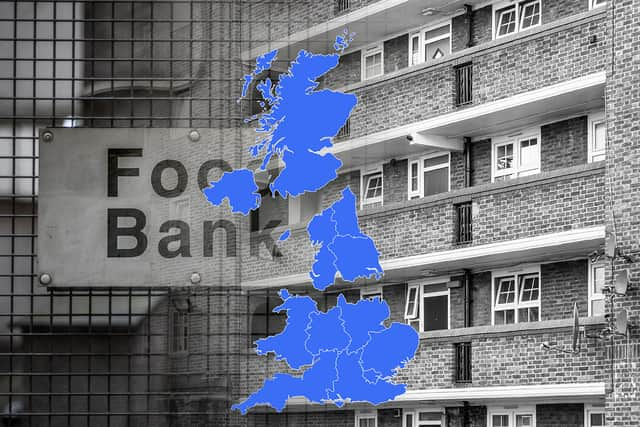UK is ‘most regionally divided country, and getting worse,’ with north of England severely impacted
and live on Freeview channel 276
If the North of England was a country it would have one of the lowest rates of investment of all the developed nations, with countries like Slovakia, Poland and Hungary all experiencing greater investment than both the UK and the north, a new report on regional inequality shows.
Productivity and hourly pay in the north of England are significantly lower than the national average, with workers in the north taking home £1.60 less per hour than their counterparts in the rest of England, according to IPPR North’s State of the North report.
Advertisement
Hide AdAdvertisement
Hide AdThe report’s authors warn that the UK is “the most regionally divided country and getting worse,” while a new report by MPs shows that the number of children living in poverty in the North of England increased to more than one in three during the pandemic.


UK ‘stands out for all the wrong reasons’
Systematic underinvestment in infrastructure, transport, research and development are holding the UK back, and the North of England in particular, the think tank argues.
If investment levels had been the same as the OECD average, the UK would have benefited from an additional £397 billion in investment between 2017 and 2020, with around £195 billion going to the North.
Based on a comparison of investment as a proportion of GDP among all 38 OECD countries, analysis by IPPR North shows that only Greece has a lower rate of investment than the North of England, while the UK overall ranks 35th, behind Latvia, France, Germany and the USA.
Advertisement
Hide AdAdvertisement
Hide AdThe report’s author, Marcus Johns, research fellow at IPPR North said the UK “stands out internationally for all the wrong reasons”.
He said: “Of all the advanced economies around the world, ours is the most regionally divided and getting worse – the North is at the sharp end of these divides and that’s a barrier to prosperity. But what’s even more unacceptable is that our country is divided by design. It is the result of decisions.The North’s strengths are national strengths. Northern prosperity can be national prosperity. It’s up to the government to unlock this potential, by acknowledging that it has to change, and by enabling empowered, well-resourced local government to coordinate and deliver long term local visions for change. There are plenty of examples out there for how we can do better”.
The report points to alternative models for regional development around the world that have succeeded in levelling up through investment, progressive taxation and devolved power.
They include Leipzig, in Germany, which is the fastest growing city in Europe. As pointed out in a recent select committee hearing on levelling up funding by Greater Manchester mayor Andy Burnham, Germany has a constitutional commitment to reducing regional disparities in living standards. Long term job creation is 16 percentage points higher in Leipzig than the North of England.
Advertisement
Hide AdAdvertisement
Hide AdLuleå in Sweden is also highlighted in the report, as an area which has achieved success through the transition to net zero, shifting away from jobs in fossil fuel-related industries toward cleaner technology.
Carina Sammeli, Mayor of Luleå said: “We as a municipality are too small to do the transition alone, this is only possible through cooperation between local, regional and national levels, and the industry. If we do this right, we will make it possible to start a new industrial era in Europe that will create jobs here and slow down the climate changes”.
One in three children in poverty in the North
A report by a group of MPs looking at how the cost of living crisis impacts children in the North of England has found that 34% of children in the north (around 900,000) were living in poverty during the pandemic, compared with 28% in the rest of England.
The Child Poverty And The Cost Of Living Crisis report from the All-Party Parliamentary Group (APPG) Child of the North, released on Tuesday, shows that proportionally more households in the north were fuel poor prior to the cost of living crisis than in the rest of England, while families in the north are more likely to be living in poor quality, damp homes.
Advertisement
Hide AdAdvertisement
Hide AdSouth Shields Labour MP Emma Lewell-Buck, who is co-chairwoman of the APPG, said: “Whilst poverty is, sadly, not a new experience for many children in the north, the scale and severity of deprivation is now unprecedented. As the cost of living crisis worsens, vulnerable children and families, especially in the north, are being pushed to the edge.
“This report outlines the injustice of deprivation in our country and presents policy measures that, if implemented, could ensure that children in our region are never left hungry, cold or without.”
Comment Guidelines
National World encourages reader discussion on our stories. User feedback, insights and back-and-forth exchanges add a rich layer of context to reporting. Please review our Community Guidelines before commenting.
